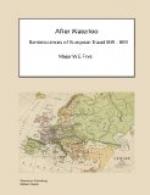I had scarcely been three months in England, when the return of Napoleon from Elba, and the extraordinary dislocation of the Bourbons from the throne of France, summoned Europe again to arms; the crusade is preached at Vienna, and behold! his Grace of Wellington appointed the Godfrey of the holy league. I had reason, about six weeks before the news of this event reached London, from some conversation I had with an intelligent friend, who had just returned from a tour on the Continent, to suppose that the slightest combination against the Bourbons would prove successful, from their injudicious conduct and from the temper of the people; but I never could have supposed that the return of the man of Elba would be hailed with such unparalleled and unanimous acclamation. As I had long ago wished for an opportunity of visiting the continent of Europe, which had never before occurred to me, I eagerly embraced the offer made to me by my friend Major-General Wilson, formerly Lieut.-Governor of Ceylon,[1] to accompany him on a military tour through the country about to be the theatre of war. Though I had never before visited the Continent (except with the British army in the invasion of Holland in 1799, when I began my military career), yet I was not wholly unprepared for travelling, having united to a classical, as well as military education, a tolerable knowledge of history, and a partial acquirement of the principal modern European languages, which I had begun to learn when very young and which I kept up during my leisure hours in India, which, like those of Don Quixote, were many. I preferred this study infinitely to that of the Asiatic languages, for which I never felt any taste, as I dislike bombast, hyperbole and exaggeration; and though an ardent admirer of the Muses, I never could find pleasure in what Voltaire terms “le bon style oriental, ou l’on fait danser les montagnes et les collines,” and I prefer the amatory effusions of Ovid to those of the great King Solomon himself.
The war will no doubt commence in Belgium, and of course the Emperor Napoleon will be the assailant, for it cannot be supposed that after the act of ban passed against him by the Amphictyons of Vienna he will remain tranquil, and not strike the first blow, which may render him master of Belgium and its resources.
We embarked at Ramsgate on the first of May for Ostend on board of a small vessel bound thither. Our fellow passengers were two officers of dragoons, several commissaries with their servants, horses, etc. After a passage of twenty-four hours, we entered the harbour of Ostend at one o’clock the following day. Ostend, once so flourishing and opulent, has long since fallen into decay; its usual dullness is however just now interrupted by the bustle of troops landing to join the allied army. Cavalry, infantry, artillery, horses, guns, stores, etc., are landed every minute. The quays are the only parts of this city which can boast of handsome buildings; the fortifications seem to be much out of repair; in fact, the aggrandizement of Antwerp occasioned necessarily the deterioration of Ostend.




